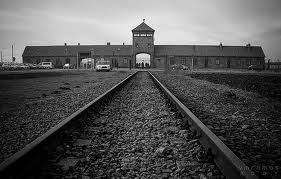Today marks the 70th anniversary of the Wannsee Conference, where senior officials of the NS-regime met to decide on the "Final Solution to the Jewish Question". To mark the occasion, an American professor of political science – Dr. Paul Gottfried – has published a piece absolving Germans of any guilt in the Holocaust. According to Gottfried, the notion that the German people were complicit in carrying out the "Final Solution" is a "leftist" myth that has been used to demoralize Germans and force them to turn away from their national identity:
Basic to this self-flagellation is having Auschwitz serve, in a former German foreign minister’s words, as the “founding myth for the German Federal Republic.” One must believe that not only did the Third Reich murder millions of Jews, but that Germans of all classes and regions happily cooperated.
This borders on Holocaust denial. And Gottfried goes on to accuse "leftists" of lying about the role of the Wehrmacht in participating in the mass murder of Jews and other ethnic groups. Gottfried repeats the claim made by right-wing nationalists that the Wehrmacht is blameless and was simply fighting a war for national honor. Professor Gottfried bases his conclusions on the work of a single historian:
It is against this background of lunacy that Alfred de Zayas, a retired high official from the UN Commission for Human Rights, has released Völkermord als Staatsgeheimnis (Genocide as a State Secret, 2011). Zayas has authored other controversial works that go against the prevalent leftist grain. Among his earlier studies are heavily documented examinations of Eastern Europeans’ organized murders of Volksdeutsche (ethnic Germans) after the Second World War, as well as the postwar agreements that greased the skids for these crimes. Zayas’s works are all painstakingly documented, and his latest study is based on thirty-five years of interviews and a laborious sifting of sources. The author fine-combed the records and testimonies of the Nuremberg Trials in 1946-47 and interviewed surviving “war criminals” including Albert Speer and Admiral Karl Dönitz, the Nuremberg prosecutors, and former war prisoners of the Nazis.



4 comments
Has anything changed, today, as we live in democracies with free speech and access to informations of all kinds? What do we know or, at least, could know today? As Hitler explained in Mein Kampf, nazi propaganda was just a copy of anglo-american war propaganda. Not as a coincidence ‘Duck and cover’ was a well known song in the U.S. in the fifties… Surely many many Germans knew about the holocaust, but how many of them thought it was typical war propaganda?
The USA has a strange relationship Germany and Europe in general. I am not sure I understand it, but I have taken some anger-management and communications classes, and many of the problems and agreements between the USA and Europe seem like bad communication. People make assumptions about feelings and imagine that the other person knows things or should know about things that they dont. I would say that there is a very fantasy-oriented relationship between the USA and Germany. Sometimes maybe some dumb American absolves Europeans like a dog sniffing up to a hand with a treat. Sometimes an American hates Europe. But overall, there is a basic communication gap, and I dont see either Americans or Europeans really communicating in a mature fashion.
I have to take exception to the view put here. De Zayas is a serious scholar whose work on the mass expulsion of Germans is sound and legitimate. Whilst claims that no Germans outside the SS ‘knew’ about the Holocaust or that the Wehrmacht was spotless are clearly false, so is the notion that basically all Germans knew and were complicit. Whilst there were ‘leaks’ it was still a mainly secret program carried out mostly outside Germany with no public coverage, and certainly no popular consultation as such. The average German was not in a position to know about the killing, even if some heard rumors, few could verify, let alone act. Certainly in the state apparatus there would have been more awareness but far from universal. The postwar survey proves little, as it was subject to bias due to massive postwar coverage, and there is clearly a distinction between hearing rumors and actually having firm knowledge. Compare to Stalin’s USSR, many had some concept of the purges etc (on top of the victims of course) but few outside the concerned organisations had any clear idea that millions were being liquidated, and even those who did risked the same fate if they tried to act.
A statement like this “Of course people knew what was going on” is useless as it makes no due distinctions between individuals, some ‘knew’, to varying degrees, some didn’t. It’s simply the mirror of the attitude under criticism, ie that none (apart from the perpetrators) knew. Neither are valid as such.
And in the German wiki article Helmut Schmidt is quoted as saying neither he nor his family knew, even though some gave temporary refuge to Jews, and they lived near two camps, and like many others then, and that the first he knew was after the war. Clearly there were many who did not, and it is not surprising for the reasons enunciated.
Comments are closed.